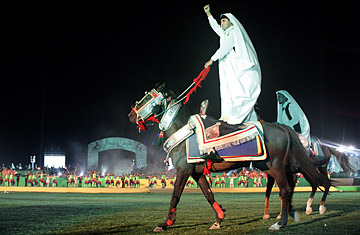
A ceremony is held for Libyan leader Muammar Gaddafi's 40 years in power at the former U.S. military base of Matega, outside Tripoli, on Aug. 31, 2009
(2 of 2)
Still, the fireworks blasted off in Tripoli on Sept. 1 with many world leaders — including Brown and French President Nicolas Sarkozy — absent. While many African and Arab leaders as well as Venezuelan President Hugo Chávez were there, Italian Prime Minister Silvio Berlusconi was the only Western European leader to attend. Britain's Prince Andrew, who is scheduled to hold trade talks with Gaddafi this week, also canceled.
None of this probably bothered Gaddafi, say Libya watchers, who believe the absences in the VIP stands were a superficial show of protest at Libya's reaction to al-Megrahi's release, rather than a sign of a rift between Libya and the West. "This is a significant country with an unusual leader, who uses his wealth to conjure up influence in places like Africa," says Richard Dalton, who was Britian's ambassador to Libya until 2002 and is now a fellow at the London think tank Chatham House. For the West, he says, Gaddafi is "much better to work with than to shun. He's shown himself reliable on the important issues."
And those issues are crucial to both Europe and the U.S. Libya's massive reserves include more than 44 billion bbl. of oil and about 53 trillion cu. ft. (1.49 trillion cu. m) of natural gas. Some of that gas is now piped under the Mediterranean to southern Italy — a valuable alternative to the politically unreliable Russian gas supplies, on which Europe is heavily dependent. U.S. officials have previously said that Washington's renewed links with Libya have proved an important source of intelligence; the U.S. dropped its sanctions and resumed diplomatic relations in 2004, after Gaddafi publicly renounced his nuclear-weapons program and created a compensation fund of about $1.5 billion for the families of those who died in the Lockerbie bombing.
For Gaddafi, the new friendship with Washington has been a smart investment that has paid off handsomely. About 45 Western oil companies now operate in Libya, investing billions each year in exploration and maintenance. "Quite a bit of damage occurred under sanctions because the oil reservoirs were not observed for many, many years," says Thamir Uqaili, a London-based independent oil consultant who spent years working in Libya. "They have caught up now in certain places."
Three years ago, Gaddafi opted to invest his excess oil revenues in a sovereign wealth fund called the Libyan Investment Authority, which has rocketed in value thanks to soaring oil prices on the world market. The fund has about $65 billion in capital, part of which Libya has used to build five-star resorts in African capitals and to run Afriqiyah Airways, which crisscrosses the Mediterranean to European cities.
With their country being wealthy, Libyans are relatively happy — even though they have little free speech and no democratic elections. Health care and education are free, and the prices of staple foods are controlled. Unlike Libya's neighbors, Egypt and Algeria, the country has "no big urban proletariat with very little money," says Dalton, who sees little threat to Gaddafi's continued rule, despite his astonishingly long reign.
Perhaps for that reason, Libyan officials seem almost indifferent to the West's ire over al-Megrahi. In fact, on Aug. 31, Minister of International Cooperation Siala told reporters in Tripoli that Libya thinks now is a good time to ask Britain to investigate an assassination plot several years ago against Gaddafi — a plot which British officials deny ever existed. For its part, Britain wants Libyan officials to divulge information about the murder of British police officer Yvonne Fletcher, who was shot outside the Libyan embassy in 1984. What happens next between Britain and Libya could reveal whether al-Megrahi's release was the start of closer ties or the beginning of a long political tug of war.
